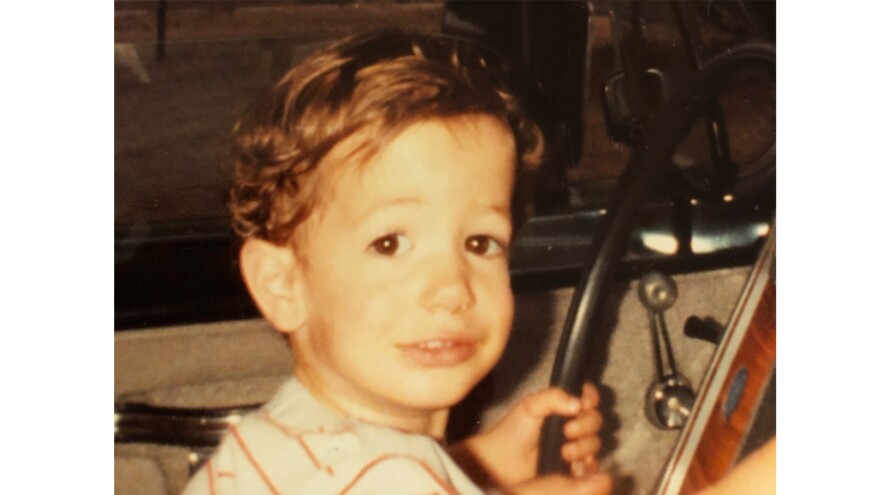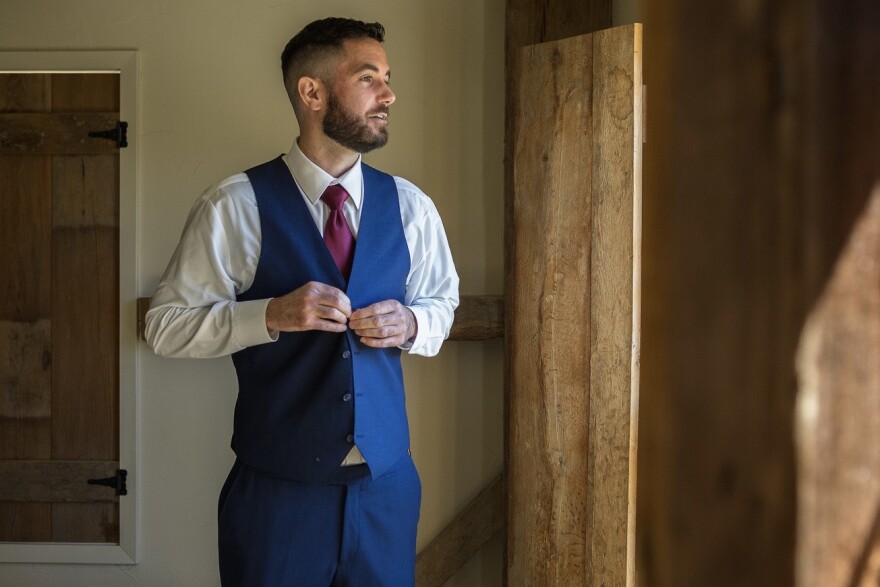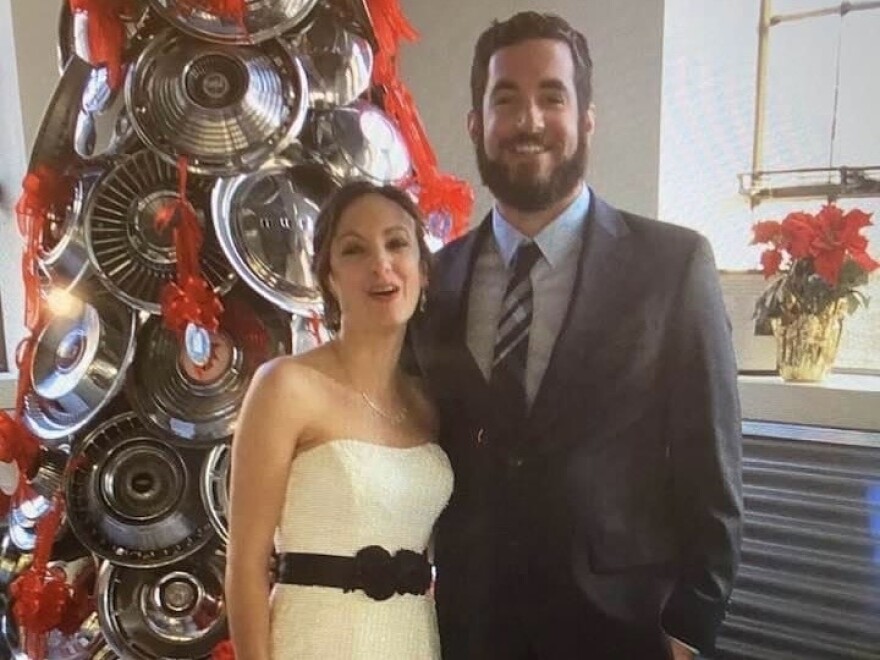MACUNGIE, Pa. — There were two things in life Glen McCartney loved.
One was cookies.
“Growing up, he loved Oreos and chocolate chips with M&Ms," his mom, Vivian McCartney of Upper Macungie Township said. "Other than that, whatever I baked, he ate it with pleasure.”
The other was cars.
“We grew up watching our dad work on cars as a hobby,” his sister, Kelly Sanders, said.
Known as “Glenmac” to family, friends and those in the tuner car show circle, McCartney succumbed to colorectal cancer in 2020. He was 35.
Glenmac was attached at the hip to his Kouki car, a 2013 Nissan 240SX painted in Lexus Pearl White.
He swapped in a turbo-charged Japanese engine, making it light and fast, a tuner car (a vehicle that’s been modified to enhance performance or look), and Sabatini Coachworks Inc. of Nazareth spiffed up a customized interior. The finished product was four years of love and work, resulting in several car show awards, including Tuner Evolution York's 'Best Nissan,' Slammed Imports Top 10, and Downshift Nation's Best Paint at the auto expo.

To honor their late son and brother, who last month would have turned 40, Glenmac’s family will hold its second annual “Cars and Cookies,” from 9 a.m.-1 p.m. Sunday, June 8, at Macungie Memorial Park, 50 Poplar St., Macungie.
About 100 antique, muscle and exotic cars will be there (anything with wheels is welcome, his dad said), along with local bakeries and cookie and food vendors.
Raffle prizes include a $400 detailing gift certificate fromThe Clean Garage in Allentown, where Glenmac was among the first customers when it opened, as well as other auto-themed prizes from Exotic Car Gear, Black Glass Tinting, RT Tuning, OCD Detailing, and more.
Proceeds from the show benefit the Colorectal Cancer Alliance, the leading nonprofit organization dedicated to the disease. It offers a variety of sources and support to patients, caregivers and families going through colorectal cancer.
'Only five years away'
Emily Blasi of the CCA said from her Washington, D.C., office Friday that "colorectal cancer is the number one deadliest cancer among men, and number two among women.”
“Incidents of the disease continue to rise, and experts predict it to be the leading cause of cancer death of both men and women ages 20-49 by the year 2030.
“Only five years away. Sadly.”
"We’re here to reverse that. Screening can save lives."Emily Blasi of the Colorectal Cancer Alliance
But colorectal cancer is one of the only cancers that’s preventable and, if caught early, treatable.
“We want people to not only know the risk factors and symptoms, but to go out and get screened," Blasi said. "If precancerous polyps are found, they can be removed, preventing the disease.
“Caught early and treated, there’s a 90 percent survival rate. That’s why screening is so important. Many people are either unaware of the importance of screening, or just putting it off.
“There’s a stigma around it. People don’t want to talk about their colon or bowel movements. There’s an uncomfortable feeling talking about it.
"We’re here to reverse that. Screening can save lives."
'Everyone has a colon'
Screening can be 30-minute colonoscopy in which a doctor inserts a thin, flexible tube with a camera that can show either a smooth, healthy mucosal lining of the colon, or something called a polyp, which is a growth of tissue projecting from the mucous membrane of the colon.
Some people say they can’t find the time. It’s a lot of prep time, so there’s apprehension associated with the colonoscopy.
“I think people just really are not considering that it would happen to them," Blasi said. "I think most people just feel like it won't."Emily Blasi of the Colorectal Cancer Alliance
“But there are so many advancements in the different options for screening now" Blasi said. "If you’re really busy, there are at-home screening tests, Cologuard, easy, quick, really no prep time"
It involves ordering a kit through the mail, collecting a stool specimen into a provided container following simple instructions, and mailing it away to be tested.
“If you get a positive result, you do have to get a colonoscopy, but if it’s negative, you’ve at least gotten screened" she said. "Know your options.”
She suggested an initial free quiz at getscreening.org.
“People at average risk should begin screening at age 45," she said. "With risk factors the quiz addresses, then do it earlier.”
If you don’t know if you have risk factors, the screening quiz will ask you questions and recommend your personal timeline for screening. Print it and take it to the doctor.
“I think people just really are not considering that it would happen to them," Blasi said. "I think most people just feel like it won't.
"Colorectal cancer doesn’t discriminate. Everyone has a colon."
Colorectal cancer symptoms
According to the American Cancer Society, colorectal cancer symptoms are:
- A change in bowel habits, such as diarrhea, constipation or narrowing of the stool, that lasts for more than a few days
- A feeling that you need to have a bowel movement that’s not relieved by having one
- Rectal bleeding with bright red blood
- Blood in the stool, which might make the stool look dark brown or black
- Cramping or abdominal (belly) pain
- Weakness and fatigue
- Unintended weight loss
'He fought hard'
Too often, symptoms go unnoticed or ignored.

Glenmac was a quiet guy who kept to himself and his family said they were shocked to learn his diagnosis.
The first clue something was wrong was when he asked his parents if they could drive him to his colonoscopy appointment back in 2019.
“There’s no family history," his dad said. "He and all of us were genetically tested, too, and no genetic markers. Who knows why?
“Pay attention to what your body’s telling you, especially when you’re pooping.”
Glenmac’s doctor came out and told his parents the tumor was so big they couldn’t get past it to complete the procedure.
There was chemotherapy, surgery and a temporary ostomy, a surgical opening that diverts waste or urine from the body during disease.
A second opinion yielded a series of events that no one could have predicted.
“He fought hard,” Sanders said this week on the phone. “He had surgery, chemo, they thought it was gone, and it spread to his brain within the year.
"He passed away in October 2020, during the pandemic.”
Up to the end, Glenmac kept his go-with-the-flow, it-is-what-it-is personality, his family said.
'An unbelievable car'
Five years after his passing, his family gets through their grief individually, and as a team as best they can.
Sanders had immediately thrown herself into advocating for colorectal cancer screening, volunteering with the CCA, meeting other advocates and survivors.
“You start kind of advocating in this space, and then all of a sudden, people come up to you and will tell you that they have lost someone due to the disease, or they had it.
"And you realize how prevalent it is. I’ve had people tell me they’ve gotten colonoscopies because of me.
“Sometimes it’s hard. He was more than the disease. We talk about him in terms of the disease, but this fundraiser is nice because it focuses on his hobby.”

Glenmac had taken his kouki to some shows — and had won awards that the family wound up discovering while they were cleaning out his apartment after he passed.
“It was really quite funny to find those" Sanders said. "He was so humble, he didn’t necessarily talk about himself, he was such a very private person.
“I am just the opposite — and I’m using this platform as an advocate to talk about this story.”
“He never did drift race the car,” his dad said. “It wound up the car came out too nice with the body kit he had put on it.
"He was very soft spoken. He moved back home so we could help take care of him. He brought the car here. I never even knew the interior was custom done. He never told me. It ended up being an unbelievable car.”
Keeping Glenmac’s memory alive, his dad, also Glen, now takes the car to shows. The first one he did, at Coca Cola Park, it won best in show.
'My way of contributing'
Decorated car-themed cookies by local vendors including Hayden's Confections will be offered at the event to help raise funds for the CCA.
So will Glenmac’s mom, whose said he would routinely peek into her freezer to see if there were any cookies he could wash down with a hot cup of coffee after stopping by for dinner.
“The first year after he passed, I didn’t bake at all,” she said. “Then slowly, I started to bake again.”
“It’s just something that we’re doing in his honor. I wish that I didn’t have to.”Vivian McCartney, Glenmac's mother
She has a young granddaughter now who enjoys cookies as much as the uncle she knows only through stories, but whom Glenmac met and held and cherished.
“I do it now because I feel with the car show, it’s something that I can contribute" she said. "My husband and daughter do the technical and networking and car things with it, and it’s my way of contributing.
“It’s just something that we’re doing in his honor. I wish that I didn’t have to.”
Cars and Cookies is partly sponsored by St. Luke’s Colorectal and Surgery Center. To donate to the Colorectal Cancer Alliance, visit ccalliance.org.
Sanders said last year’s event, despite rain, raised $5,000. She intends to grow that number and help locally, as well.
According to the CCA, results from a survey this year surrounding the state of screening showed that 98% of people said if they knew screening would prevent colorectal cancer, they would get it done.


